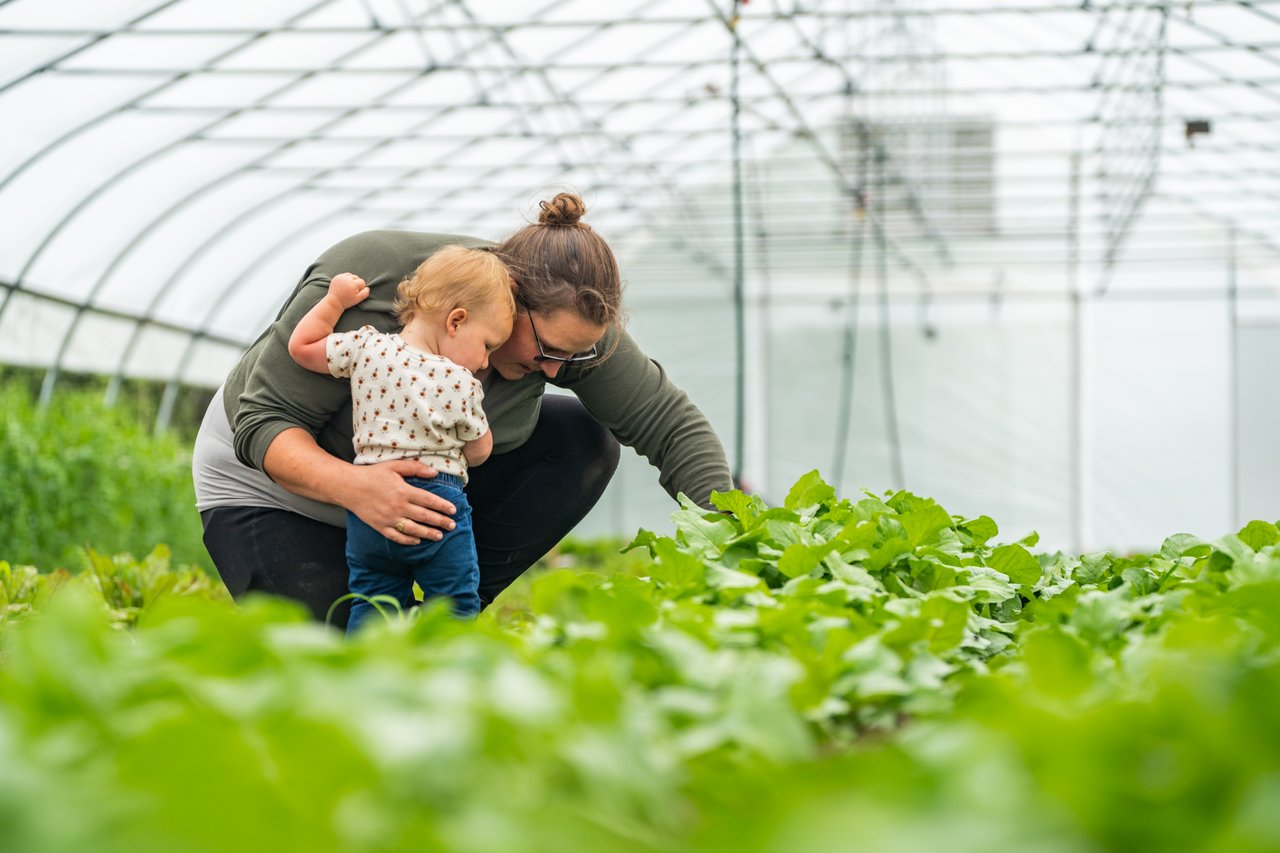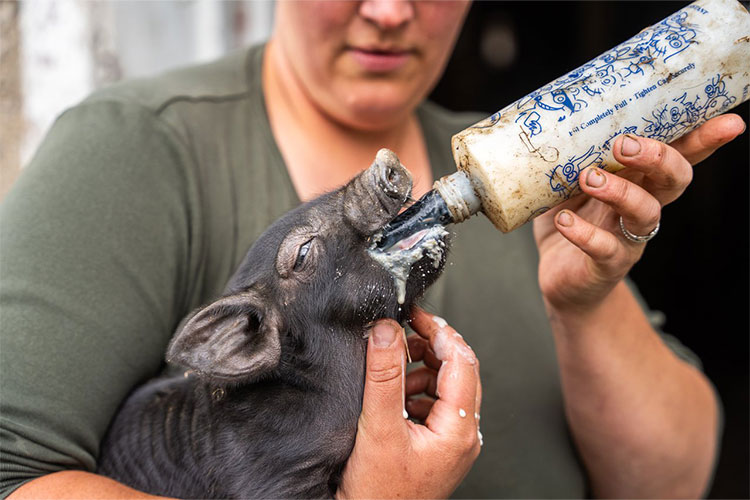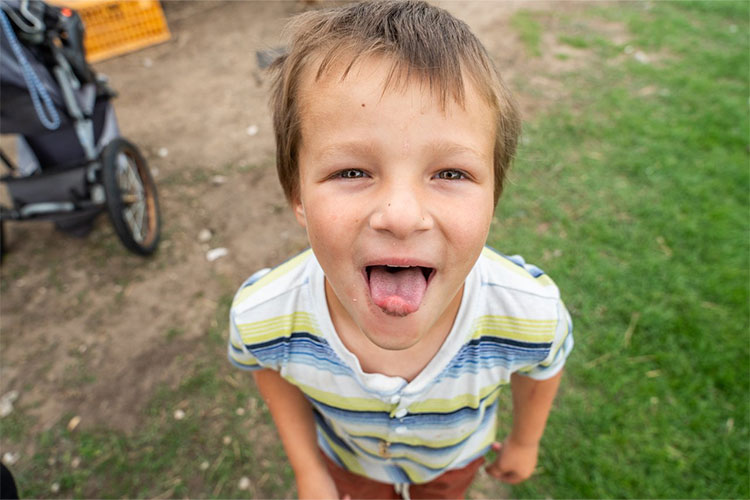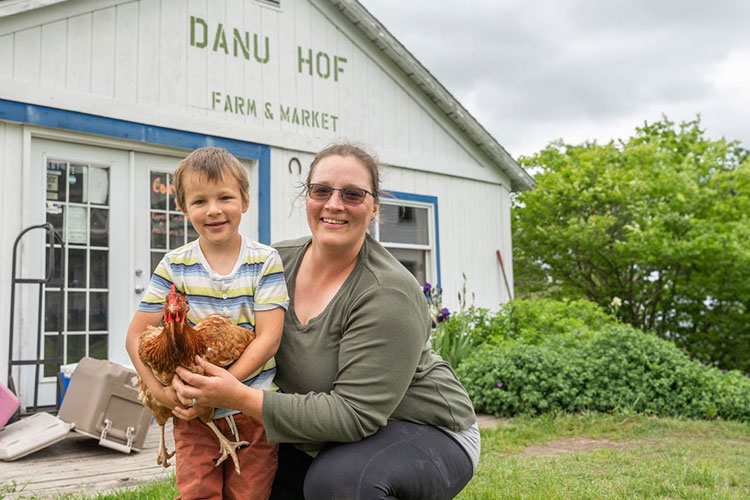
Caitlin McSweeney-Steffes of Danu Hof Farm and Market
Down on the Farm
Born and raised in Michigan, Caitlin McSweeney-Steffes always dreamt of owning a family farm in her home state.
After receiving a degree in business and hospitality management from Northern Michigan University, Caitlin left the U.P. to pursue work in Traverse City. She landed a job at the Grand Traverse Resort, starting in housekeeping before moving to the culinary department. That is where she met her husband Larry, who shared her dream and vision of owning a family farm.
Another moment of serendipity for the couple was stumbling upon the place that would eventually become their family farm, Danu Hof Farm and Market. Located in Mancelona, a small village in Northern Michigan, the farm is named in honor of Caitlin and Larry’s shared Celtic heritage – Danu is the earth-mother goddess in Celtic mythology, while Hof, the German word for “farm,” pays tribute to the German immigrants who first purchased the land in 1864.
Since 2017, Caitlin and Larry have been breathing new life into the farm, raising their four children along with pigs, chickens and a variety of crops. From offering cooking classes to working with other local farmers and artisans, supporting Michigan’s agricultural community is a passion – and a way of life.

What is some of your previous hospitality and culinary arts experience and how did those experiences lead to an appreciation and knowledge of farm foods?
I have been working in kitchens since my first job at 15 for a local pizza place. Working at the resort we both saw so much food waste. Working at Harvest in Traverse City was the first time I really worked with local food and farmers on a regular basis, which is where my knowledge and appreciation for local food really started to grow. I have worked both in mom-and-pop restaurants as well as franchises, and I have been on the staff while opening two different restaurants. Growing up in Traverse City, Larry had a closer connection with the local farmers and what foods were available; he worked his way up through kitchens and was finally the executive chef of the Grand Traverse Resort, so he worked closely with many different farms. At Harvest, the owner would go to the farmers market and order other produce to be delivered, and then it was our task to figure out what menu items we would create with what was available. It was a lot of fun to have the room to create.
How did you learn about the farm in Mancelona and what inspired you to take this on?
It’s a funny story. We had been talking and making a five-year plan to buy land and do a little farming; we were also planning our wedding. Larry was driving up to meet friends, missed his turn and drove by the house. Two weeks later, we were in the area, and he decided without saying anything to me to take me to the house. I fell in love – really, we both did. It was crazy, we walked around peeking in windows and on the way home I even made an appointment with the realtor to walk through the house. But we were doing it as dreamers expecting to be laughed at or told ‘no way,’ especially once we found out that it was not just the house and a few acres, but 160 acres. In October 2017, we signed for the house, packed up everything and moved out here. Then we headed back into Traverse City and got married a few days later. And on another crazy whim, we had our first livestock – a sow and her five piglets – by the end of October because of a Facebook post Larry got tagged in. That honestly has been how a lot of things have happened on the farm. We put an idea out and if it rolls, we roll with it.

In your website’s bio, you describe an interest in being a part of revitalizing our rural communities. Can you expand more on that idea?
We all know the current system isn't sustainable and I'm not sure how to fix it other than being a drop in the bucket and hoping it creates a ripple effect. We need to switch back out of monoculture and ‘get big or get out of farming’ mentalities. We hope by breathing life back into this farm, as it was once one of the main dairy farms in the area, that we can help wake the rural community up, bring in more positivity and help to rebuild the community. That includes small farms working together, because no one farm needs to do it all either. There can be a cyclical balance. Everyone deserves access to healthy food. We also try to use our business dollars as locally as possible. We have a great location just off 131 and the previous owners already had a building set up as a store, so we have continued the store and not only carry goods from our farm but work with other local farmers and artisans carrying their seasonal goods and produce. For years we have been told, ‘You want to move out of the country and into the city for work,’ and that mentality and thinking really needs to change. We need our rural communities, and they can be vibrant and amazing places. They just need a little love and for people to see the potential. We also hope by working with other local farmers and rebuilding the connections that we can shift the mentality from competing to working together and complementing each other. Each farm is different and has different strengths, land possibilities and interests, and we all need to work together to be the change that needs to happen in our food system. No one farm can do it alone.
Your farm is almost 150 years old – what does it mean to you to take on this legacy, honoring its past while also bringing it into a new generation?
We are just the current stewards of the land. It's very important to us. I spent our first winter here digging into the history of the farm and the first families. I learned that our farm was originally purchased by families that were part of a group of German immigrants. I was even able to track down family pictures and newspaper articles as well as meet the granddaughter of Daniel Makel who was the one to put the farm together into what it is today. It is why we have the ‘Hof’ in our name. It is the German word for ‘farm.’ We wanted to pay tribute to those who have farmed here before us, and we will do all we can so that it can continue to be sustainably farmed for many more generations to come. We are just this farm's current chapter. I was able to find an article in the local paper at the time when this farm was working with the USDA to test and experiment with fertilizer mixes for the first time ever for their potatoes. Hopefully we can continue that and keep being on the cusp of new farming practices for the future and keep learning.
You recently had your first daughter and have three sons. What is the experience like raising a family on the farm? Do the older ones like getting involved?
It was a big move for the older boys, but now they wade into the farm work when we ask them to. We moved them out here but didn't feel we had to require or force them to wade into our crazy idea with us unless they wanted to. It's been a big change, but good. It is a different pace to life, but also means that we can be present in their lives, which was something we were not afforded in our careers. It is an amazing teaching platform and lots of hands-on learning. I love being able to be present in their lives and that we can include them in what we do.
You also hold seasonal dinners and classes – how does this help marry your experience in hospitality with your new roles on the farm?
So many have lost the connection with food, where it comes from and even how to take it from raw form to the table. We hope that with our culinary knowledge, we can help to bridge the gap and reclaim some of that lost knowledge our grandmothers had. We hope to give hope to others thinking about doing the same thing. We are first-generation farmers and that can look like a giant roadblock. With the dinners, it is a chance to use our talents in hospitality to showcase not only our farm, but other local businesses. We have learned a lot over these years and are happy to share.







